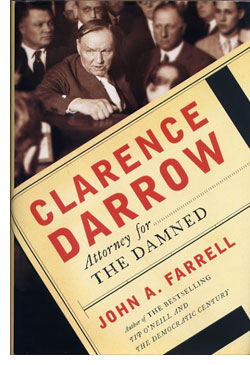 |
 |

John A. Farrell
Clarence Darrow: Attorney for the Damned
Reviewed by: Rick Kleffel © 2011
Doubleday / Random House
US First Edition Hardcover
ISBN 978-0-385-52258-8
Publication Date: 06-14-2011
564 pages; $32.50
Date Reviewed: 06-19-2011
Index:
Non-Fiction
In fiction, we are abjured to write what we know. In non-fiction, that's supposed to be the law. With biography, this means that we have to stick to letters, documents, and recordings that we presume to be unchanging. The upshot of this is that biography can be static; that is, a single early work can dominate a field.
This can change, however, if new information about a subject comes to light, for example, if new papers are discovered. Then a lifelong interest in a historical figure can be transformed into a transformative work of biography, one that changes the way we see history and those who made it.
John A. Farrell, author of the defining and engrossing 'Tip O'Neill and the Democratic Century' found himself in just such a situation with regards to Clarence Darrow. Here was a man whom Farrell had admired since his childhood. He was also the subject of a defining biography by no less than Irving Stone in 'Clarence Darrow for the Defense'. Darrow played a central role in 'Big Trouble' by Pulitzer Prize-winning Anthony J. Lukas, in 'Big Trouble.'
But the discovery of new papers brought to light significant new facts; Darrow was not the man we thought him to be. What we now know offered Farrell the opportunity to write 'Clarence Darrow: Attorney for the Damned,' (Doubleday / Random House ; June 14, 2011 ; 978-0-385-52258-8 ; 564 pages ; $32.50) an immersive, detailed vision of Darrow not just as a hero, but a human.
Farrell's work is exhaustively researched and richly revealing, but it's not exhausting to read. You can't help but realize when you pick up the book that this is a book to get lost in; at 500-plus pages, this is clearly a significant commitment for readers, but the rewards here are revelatory. And Farrell is a smart writer. He does not burden the narrative with unnecessary exotica. This is a focused, intense story of a Byronic hero, a man whose good work outweighed his tragic flaws.
We meet Darrow in Chicago, at the cusp of the decision that will change his life. Farrell sets up Darrow's voyage into populism and the politics of protecting the American underclass, then ratchets back to his childhood. We see him mourn his mother's death, then make the move to Chicago. The bulk of the book then dives into Darrow's legal and extra-legal life, in a series of chapters that are exciting and compulsive reading.
There's a lot to like about Farrell's work. He knows how to create a smart character arc for Darrow, and keep readers involved in the overall reading experience, even as he is presenting evidence that Darrow is not a straight arrow. Farrell highlights the major legal battles that made Darrow famous, some presented with new information that cast the man into a new and less-flattering light. But he also focuses on other ways in which Darrow was well ahead of his time; for example as a champion of women's right to vote.
Farrell's work upends our vision of Darrow as a white knight and rewrites him as a Byronic hero, flawed, but faithful to those he represents — even when he is representing himself, unfortunately. The new material unearthed by Farrell and others enables the author to show Darrow as profoundly intelligent, highly-motivated and ultimately, human. On one hand it's disappointing, but because Farrell knows how to build not just a character arc, but an entire historic vision, it's surely an engrossing reading experience.
'Clarence Darrow: Attorney for the Damned' is superbly written, with prose that flows and keeps the reader deeply involved in another time and place, even as Darrow's progressive views are starkly rendered with regards to their relevance in the here-and-now. What Darrow saw as possible and positive might seem improbable in today's political environment. Farrell's biography is truly new and offers a portrait in depth of a man who helped shape the nation. By rewriting what we did know with what we now know, Farrell's history makes the past present, in our minds. It's up to us to make the messages from that past present in our lives.
|
 |
|
|
 |
| |
Review Archive
All Reviews alphabetized by author.
General Fiction
Non-Genre, general fiction and literature.
Horror
Supernatural fiction, supernatural horror and non-supernatural horror.
Science Fiction
Science fiction, science fantasy, speculative fiction, alternate history.
Fantasy
Fantasy, surrealism and magic realism.
Mystery
Crime, thrillers, mystery, suspense.
Non-Fiction
Non-Fiction, True Crime, Forteana, Reference.
Poetry
|
|
 |
|




